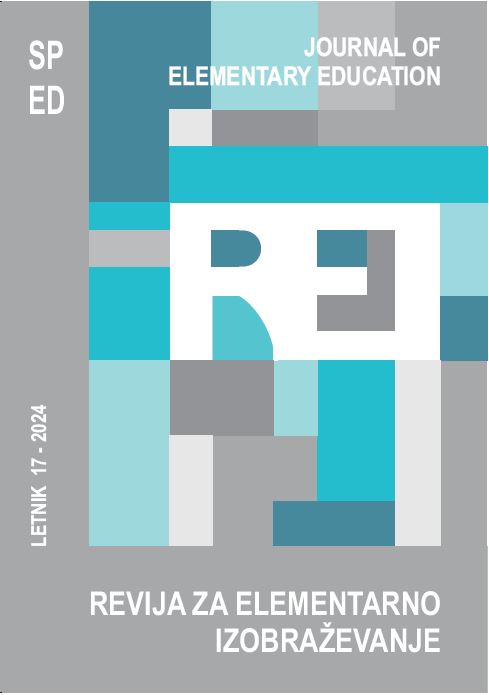Developing Teachers’ Intercultural Competences Through International Mobility Programmes
DOI:
https://doi.org/10.18690/rei.4577Keywords:
international mobility, intercultural competence, professional development, primary school teachers.Abstract
The main aim of the paper is to explore primary school teachers’ attitudes towards the impact of international mobility on their professional and personal development, with a special focus on the ways mobility contributed to the development of their intercultural competences. We present the results of a qualitative study based on semi-structured interviews with teachers (n=10) who have taken part in Erasmus+ mobility abroad. The results of the study show that the experience of mobility proved to be a positive one for all interviewees who reported numerous benefits in terms of professional and personal development of the participants as well as in terms of gaining intercultural competences.
Downloads
References
Baloh, B., & Bratož, S. (2019). Refleksija vloge učitelja v čezmejnem prostoru. Razprave in Gradivo: Revija za Narodnostna Vprasanja, (83), 5-19.
Biasutti, M., Concina, E., Frate, S., & Delen, I. (2021). Teacher Professional Development:
Experiences in an International Project on Intercultural Education. Sustainability 2021, 13, 4171. https://doi.org/10.3390/su13084171
Bracht, O., Engel, C., Janson, K., Over, A., Schomburg, H., & Teichler, U. (2006). The professional value of ERASMUS mobility. Kassel, Germany: International Centre for Higher Education Research, University of Kassel, 84-106.
Bennett, J. M. (2011). Developing Intercultural Competence: For International Education
Faculty and Stuff. AIEA Conference, 20. – 23. 2. 2011, San Francisco.
Bešter, R., & Medvešek, M. (2016). Medkulturne kompetence učiteljev: primer poučevanja romskih učencev. Sodobna pedagogika, 67(2), 26–44.
Byram, M., Gribkova, B., & Starkey, H. (2002). Developing the Intercultural Dimension in Language Teaching. A Practical Introduction for Teachers. Council of Europe, Strasbourg, https://rm.coe.i–nt/16802fc1c3
Collinson, V., Kozina, E., Kate Lin, Y. H., Ling, L., Matheson, I., Newcombe, L., & Zogla, I. (2009).
Professional development for teachers: A world of change. European Journal of Teacher Education, 32(1), 3-19.
Council of Europe. (2010). Council of Europe Charter on Education for Democratic Citizenship
and Human Rights Education. Council of Europe Publishing, Strasbourg. Accessed 12. 3. 2024, https://rm.coe.int/16803034e3
Cushner, K., & Mahon, J. (2009). Intercultural competence in teacher education. In: D. K. Deardorff (ed.), The SAGE Handbook of Intercultural Competence (pp. 304-320). SAGE Publications. https://doi.org/10.4135/9781071872987
Čelebič, T. (2008). Mednarodna mobilnost študentov in pedagoškega osebja v terciarnem izobraževanju. Ljubljana: Urad RS za makroekonomske analize in razvoj.
Engel, C. (2010). The impact of Erasmus mobility on the professional career: Empirical results of
international studies on temporary student and teaching staff mobility, Belgeo, 4, 351-363. http://
journals.openedition.org/belgeo/6399
Ersoy, A., & Günel, E. (2011). Cross-cultural experiences through Erasmus: Pre-service teachers’ individual and professional development. Eğitim Arastirmalari - Eurasian Journal of Educational Research, 42, 63-78.
Hammer, M., & Bennett, M. J. (2003). Measuring intercultural sensitivity: The Intercultural
Development Inventory. International Journal of Intercultural Relations, 27, 403–419.
Horta, H., Jung, J., & Santos, J. M. (2020). Mobility and research performance of academics in city-based higher education systems. Higher Education Policy, 33, 437-458.
Huber, J., & Reynolds, C. (Eds.). (2014). Developing intercultural competence through education. Strasbourg: Council of Europe Publishing.
Javornik Krečič, M. (2007). Proučevanje učiteljevega profesionalnega razvoja z metodo poklicne (avto)biografije. Pedagoška obzorja, 22(1-2), 3-27.
Javornik Krečič M., Vršnik Perše T., & Ivanuš Grmek M. (2015). Pedagoški delavci v strokovnem in poklicnem izobraževanju kot aktivni oblikovalci in usmerjevalci lastnega poklicnega razvoja. Journal of Elementary Education, 8(3), 77–94. https://journals.um.si/index.php/edu–cation/article/view/408
Korthagen, F. (2017). Inconvenient truths about teacher learning: Towards professional development 3.0. Teachers and Teaching, 23(4), 387-405.
Krmac, N. (2021). O avtoetnografiji in njeni vlogi na pedagoškem področju. Pedagoška obzorja, 36(2), 36-48.
Lazar, N. (2012). Pogledi in izkušnje Erasmusove mobilnosti učnega osebja na Pedagoški fakulteti Univerze v Mariboru. Andragoška spoznanja, 18(3), 88–96.
Makovec Radovan, D. (2018). Dejavniki profesionalnega razvoja učiteljev. In N. Ličen & M. Mezgec (Eds.), Sodobne paradigme raziskovanja izobraževanja in učenja odraslih: eseji v počastitev jubileja Ane Krajnc (pp. 133–150). Ljubljana: Znanstvena založba Filozofske fakultete.
Mayr, M., & Bizjak, T. (Eds.) (2020). Beležimo učinke. Ključni izsledki raziskav učinkov Programa Erasmus+: Mladi v akciji. Ljubljana: Movit.
Pevec Semec K., & Jazbec S. (2018). Multilingualism – A New Aspect of Teachers’ Professional Development. Journal of Elementary Education, 11(1), 39–53. https://journals.um.si/index–.ph–p/education/
Žefran M. (2015). Students’ Attitudes towards their EFL Lessons and Teachers. Journal of Elementary Education, 8(1/2), 167-180. https://journals.um.si/index.php/education/article/view/422
Downloads
Published
Issue
Section
License
Copyright (c) 2024 Manca Kastelic Šeškar, Silva Bratož, Anja Pirih

This work is licensed under a Creative Commons Attribution 4.0 International License.
